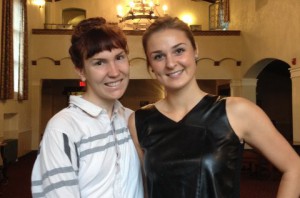
 FemTechNet’s “Dialogues in Feminism and Technology,” bills itself as the first “distributed online collaborative course” or DOCC. In their beta outing, students at 15 campuses across the country applied feminist texts to digital art, drawing connections between the dichotomies of software/hardware and feminism/masculinity. They stormed Wikipedia, created sculptures, “crafts” and images and held dialogues with others of diverse backgrounds in communities across the country.
FemTechNet’s “Dialogues in Feminism and Technology,” bills itself as the first “distributed online collaborative course” or DOCC. In their beta outing, students at 15 campuses across the country applied feminist texts to digital art, drawing connections between the dichotomies of software/hardware and feminism/masculinity. They stormed Wikipedia, created sculptures, “crafts” and images and held dialogues with others of diverse backgrounds in communities across the country.
Anne Balsamo, dean of the School of Media Studies at the New School in New York, and Alexandra Juhasz, professor of media studies at Pitzer College in Los Angeles, facilitated the first version of the DOCC. But in a sign of the DOCC’s democratic structure, it was two Scripps undergraduates, Susanna Ferrell, an art and art history double major, and Jade Ulrich, majoring in critical media studies and feminist gender studies, that applied for the innovation challenge and spoke about the project. http://femtechnet.blogspot.com/
Q: How do you describe FemTechNet to people who have never heard of it?
Jade: really it was formed to bring together a community of feminist artists and intellectuals in [a] way that was more open than you can find in any educational institution across the country and make that available to people who weren’t at elite institutions. There was a range of types of schools–it’s not just Ivies and small private schools. It was a great experience to go through the same course alongside students from Bowling Green, or open learners in San Antonio who aren’t enrolled in any sort of higher ed institution. There were different perspectives in regions across the country.

Q: And how do you design for that kind of openness? What are the different specific ways to get involved?
Susanna: There’s a lot of interactivity. We want it to be very open. Students from different classrooms around the country are making projects, sharing with other students. There’s a lot of work on Wikipedia.
Jade: I think there [are] three key learning goals that personally we’ve been the most involved in.
One is dialogue videos; professionally shot videos between 2 scholars and the moderator.
“Feminism, Technology, and Labor” from FemTechNet on Vimeo.
Then the great thing is that the students can participate with their own videos, usually shot on a Macbook.
The other two are the Wikipedia initiatives like Wikistorming and Wikithons – we do them digitally or in a space together like a community center or on a campus somewhere. Examples:
And the craft sharing at the end of the semester. That was a great way to connect the classroom to our actual lives.
Susanna: Students make an object reacting to a keyword they’ve used throughout the semester to talk about and display online. What we did last semester is students were able to place ‘bids’ on different artifacts and say why they were important to them intellectually and encourage its creator to send them the object, like an exchange.
Q: Is it lonely to be a self-declared feminist in college in 2013?
Jade: I feel like we’re really lucky because Scripps is a women’s college founded on feminist principles. But it could have only have been more valuable to students in these other communities that are craving to feel connected. We had some people at Bowling Green State University– because they felt like such a minority they had much to say, they were so enthusiastic, connecting in a way they were craving and never had a chance to explore. We don’t feel lonely but we hope it’s filling some loneliness gaps.
Q: What did you learn from the Reclaim Open Symposium about how your work , and feminist pedagogy in general, fits into the broader landscape of open learning?
Susanna: I think the way we’ve created something different than MOOCs, what made us different in a lot of ways, is that we wanted to use feminist principles of learning and sharing and collaboration. Going off that idea of safe spaces not only are we creating safe spaces in a classroom, but also online.
If you go to Youtube it’s not safe because people will get ‘hater’ comments if you really open up online. So we have gone instead to Vimeo. We’ve had a really good reception there.
Jade: feminist pedagogy is like something that people really theorize about and it’s always shifting. I think it’s this idea of constant awareness of who is being brought to the conversation and who’s being excluded. And as much as we want to include as many people as possible, we are fairly inaccessible to people who don’t have Internet access. Openness and being aware of its limitations and pushing them as well as safe space—this is going back to consciousness raising.
Susanna: And with that, showing students that being individual and having opinions or views or aspects about themselves that they wouldn’t necessarily see as feminine or masculine or anything in between–But that is also ok.
So sort of not looking at generalizations of people, but looking instead at the individual who is creating that material we’re studying.
Jade: Another principle is collaboration, this isn’t work that’s happening behind a screen that you never hear feedback about or get a grade from.
Q: What did you two learn from this experience as students?
Susanna: I came into this course not as a Gender and Women’s Studies student, so I definitely felt like I learned about feminism as a whole, both generally and as it’s applied to technology. It’s really different from any other classroom environment. I feel like our classroom last semester was more like this salon or this forum where we could talk about things we cared about personally.
Jade: I really liked to see how FEMTECHNET really stuck to their word. Their mission statement was developing students as leaders. It was never like we had to ask people for permission. We were so much a part of the creation of this initiative. So to me I think it’s really cool this started with two professors who wanted to see this dialogue, they networked, got people on board and now it’s turned into this great thing that’s getting attention and criticism too. I was glad to see that Fox News video.
“Colleges offer credit to corrupt Wikipedia”, September 7, 2013)
I think we were making waves. So my favorite thing is, it wasn’t just one class where I get my grade and move on. Even though we’re graduating, I have no doubt that we can continue being independent learners. It was unlike any academic experience I’ve ever had, and it’s not over.
Q: FemTechNet Beta runs through December—what are you planning next?
Jade: We’re working on a final collaborative Wikithon and bringing in two other schools to our campus–Cal State San Luis Obispo and Cal State Fullerton.
We’re shooting a dialogue video and a 4-hour wikithon followed by a dinner. So we’re seeing the value in collaboration online but also making efforts to connect in the physical world.
Posted in Uncategorized |
